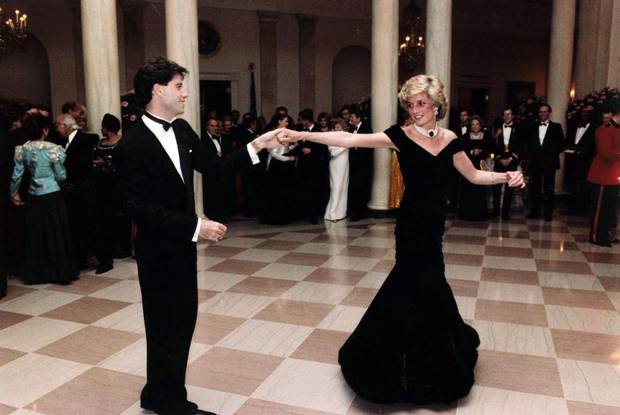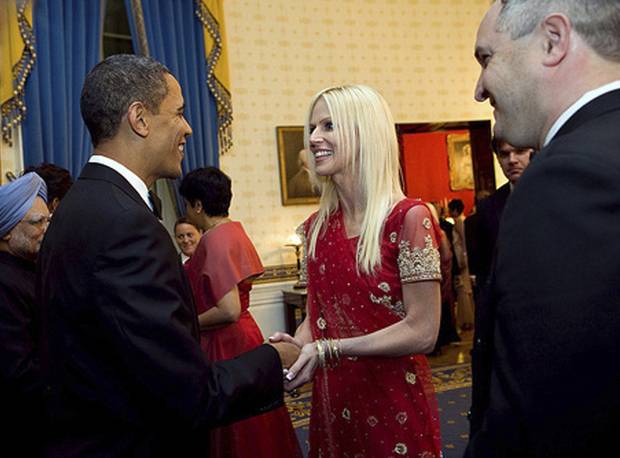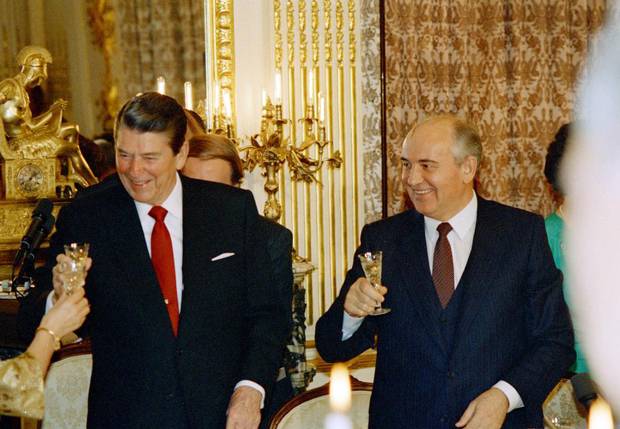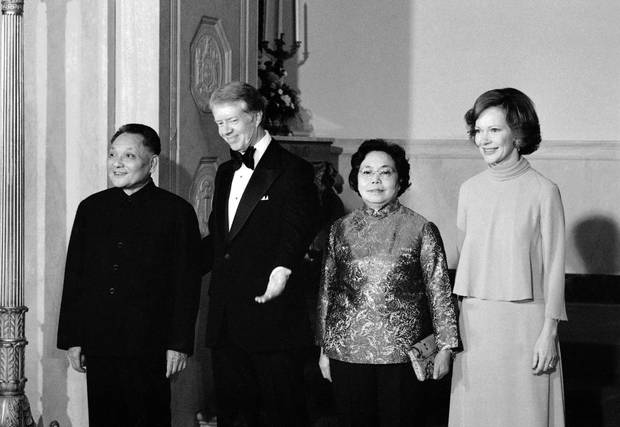
Ronald Reagan and his wife Nancy stand with Brian Mulroney and his wife Mila before a state dinner at the White House in 1988.
Gary Hershorn/REUTERS
State dinners to bestow favours, just like warships making brazen sail-bys to signal disapproval, are powerful symbolic tools at the disposal of the president of the world's sole remaining superpower.
And the symbolism of state dinners – those glittering events so eagerly sought by the not-so-powerful – ranges from American acknowledgment of another nation's emerging status as a great power, to rapprochement with a former adversary, to assuaging the manifest insecurities of friendly but often-ignored neighbours.
Even as Canadians revel in the excitement because their newly minted Prime Minister Justin Trudeau is headed to Washington to be feted by President Barack Obama in his last year in office, the timing of the official visit and the reasons 19 years have elapsed since Jean Chrétien, the last Canadian prime minister so honoured, will be examined.
The short answer, to use Henry Kissinger's version of Lord Palmerston's brilliant explanation of the foreign policy of nation states, is that: "America has no permanent friends or enemies, only interests."
Which may explain why U.S. presidents – including Mr. Obama – have laid on state dinners nine times for Mexican presidents in the last 70 years. Only four Canadian prime ministers had been invited for state dinners over the same seven decades: John Diefenbaker in 1960; Pierre Trudeau in 1969 and again in 1977; Brian Mulroney in 1987; and Mr. Chrétien in 1997.

In this Nov. 9, 1995 photo provided by the Ronald Reagan Library, actor John Travolta dances with Princess Diana at a White House dinner. (AP Photo/Ronald Reagan Library)
Mr. Obama has hosted only 11 state dinners, the least of any multiterm U.S. president and, for instance, far fewer than the 54 hosted by Lyndon Johnson during only five years in the White House.
Befitting a president who has made the "pivot" to the Pacific the central theme of his foreign policy, Mr. Obama has welcomed Asian leaders far more frequently than his predecessors. It was no accident that India was the first, signalling Mr. Obama's recognition that the world's two largest democracies had ended decades of sometimes-edgy relations but also his determination to elevate U.S. interests and prominence in Asia.
Chinese leaders have twice been invited to Obama state dinners. There have been state dinners for the leaders of Japan and South Korea and there is speculation that the President will welcome one more Asian leader – perhaps from Indonesia, the world's largest Muslim-majority nation where Mr. Obama spent part of his childhood – for his final state dinner before he leaves the White House in January.
Counting occasions and the shifts in frequency of state dinners over the decades provides not only a useful rough measure of U.S. interests but also an indicator of the most enduring and vital alliances. Anglo-American relations still trump all other – in longevity at least – with 20 state dinners for the United Kingdom. Other long-standing allies, such as France, are not far behind.
But alliance isn't enough. As American interests shift, so does the frequency of repeat invitations. Israeli leaders, invited more than a dozen times between the creation of the Jewish state and 1999, haven't been back to the White House for a state dinner since.
Among the most notable of state dinners: the first in 1874 when King David Kalakaua of the Sandwich Islands (later to become the state of Hawaii) came with his own food tasters to make sure the feast laid on by President Ulysses S. Grant was good enough; and the bicentennial celebration of the American Revolution when President Gerald Ford played host to the Queen and Prince Philip to mark the success of the uppity colonists who had defeated the greatest superpower of the 18th century.
Perhaps the most memorable moment – at least the image that endures – came at a 1985 state dinner that didn't officially merit the designation. Hosted by the Reagans, the star-studded gala was far more than the usual gathering of loyal party acolytes. It was in honour of Diana, Princess of Wales, and Prince Charles. But the memorable moment came when one of the world's best dancers, John Travolta, and the Princess who had taken the world by storm, took to the floor.
Gate-crashers steal the Obamas' debut
India, Nov. 24, 2009

U.S. President Barack Obama greets Michaele Salahi and her husband Tareq during a state dinner for India’s Prime Minister Manmohan Singh, left, at the White House on Nov. 24, 2009. The Salahi’s penetrated layers of security to enter the White House without an invitation.
Reuters
Michaele Salahi, a former make-up girl at Nordstrom and an accomplished social climber, crashed President Barack Obama's first state dinner along with her then-husband, the well-heeled Tareq Salahi. The uninvited celebrity-seekers managed to eclipse Mr. Obama's deliberate effort to signal an important policy shift that recognized India's arrival as a great power. It also marked a high point in the Salahis' habit of sneaking into Washington galas and an embarrassing low point for the Secret Service by exposing yet another security failure. But the enduring image of the Obamas' first glittering state dinner was not of the blue-turbaned Indian Prime Minister Manmohan Singh and his wife, Gursharan Kaur, in the huge tent on the South Lawn of the White House resplendent in green, ruby and gold but of Ms. Salahi grabbing the President with both hands.
It takes a (Potemkin) village to raise a child
Canada, April 8, 1997

First Lady Hillary Clinton and Aline Chretien view a demonstration of SchoolNet, a digital education tool, during a tour of Burrville Elementary School in Washington, D.C. in April, 1997.
LEIGHTON MARK/AFP/Getty Images
Celebrity chefs, rock stars, military heroes all get used to add lustre to state dinners. Sometimes those enlisted are intended just as a backdrop. During the last state dinner for a Canadian prime minister, young, poor, mostly African-American children at a D.C. public school were turned into props for then-first lady Hillary Clinton and Aline Chrétien. The plan was to show Ms. Clinton as a children's activist with a keen interest in education while touting Canada's high-tech prowess in the emerging digital age. Except it was mostly a sham. White House and Canadian embassy officials had arranged for a satellite dish, high-speed digital link and computers to be installed at the school. The women arrived and marvelled at the wonders of some of D.C.'s most-disadvantaged children chatting digitally with students in Ottawa. Then, as the motorcade raced away, technicians moved in to tear out the equipment. Red-faced officials from both nations scurried to explain away the staged event. A group of retired computer professionals stepped in to donate computers to the D.C. school. And President Bill Clinton, in his toast to Prime Minister Jean Chrétien, said: "The whole state visit has gone exactly as planned, except we didn't get to play golf."
The Gorbachevs come in from the Cold
Soviet Union, Dec. 8, 1987

Ronald Reagan and Mikhail Gorbachev share a toast during a dinner at the Soviet Embassy during the Soviet leader’s state visit in 1987.
Ron Edmonds/AP Photo
Less than six months after President Ronald Reagan delivered his famous line – "Mr. Gorbachev, tear down this wall" – at the Brandenburg Gate in what was then a divided Berlin, he and his wife, Nancy, hosted Mikhail and Raisa Gorbachev. The two leaders had just signed a breakthrough pact cutting nuclear weapons. It would be two more years before surging throngs of Eastern Europeans swept aside the Iron Curtain, but the state dinner hosted by the Reagans for the last of the Soviet leaders was a powerful harbinger of the changes to come. Ms. Gorbachev, hardly proletarian, arrived in a stunning silver mink and irked Ms. Reagan (in a dark mink) by ignoring an invitation to afternoon tea. Instead, she agreed to morning coffee and needled the first lady about the plight of the United States' black underclass. The President was presumably thinking of bigger things when at a glittering dinner, he toasted the General Secretary. "While we have fundamental disagreements about how human communities should govern themselves, it's possible, all the same, for us to work together," he said.
Disgraced Nixon has a moment of redemption
China, Jan. 29, 1979

President Jimmy Carter escorts Chinese Vice President Deng Xiao-ping and his wife Cho Lin as he and first lady Rosalynn Carter host China at the 1979 state dinner.
Dennis Cook/AP
Former president Richard Nixon was back at the White House for the first time since his ignominious departure five years earlier after becoming the first president ever to quit as he faced near-certain impeachment over the crimes and cover-up of the Watergate scandal. But, in a magnanimous gesture, President Jimmy Carter invited the disgraced former president back as a guest at the dinner honouring China's Communist leader Deng Xiaoping. The dinner sealed the normalization of Sino-American relations after decades of hostility. Mr. Nixon's China gambit, secret talks leading to a bold week-long visit in 1972, culminated in a historic meeting with Mao Zedong. American de facto acceptance of the legitimacy of the Communist regime in Beijing, not the defeated and exiled claimants in Taiwan, rebalanced the world's great powers. Mr. Carter built on the Nixon overture. Mr. Deng's arrival for a state dinner in Washington, and Mr. Nixon's moment of rehabilitation, completed a decade that started with secret diplomacy and ended with full recognition.